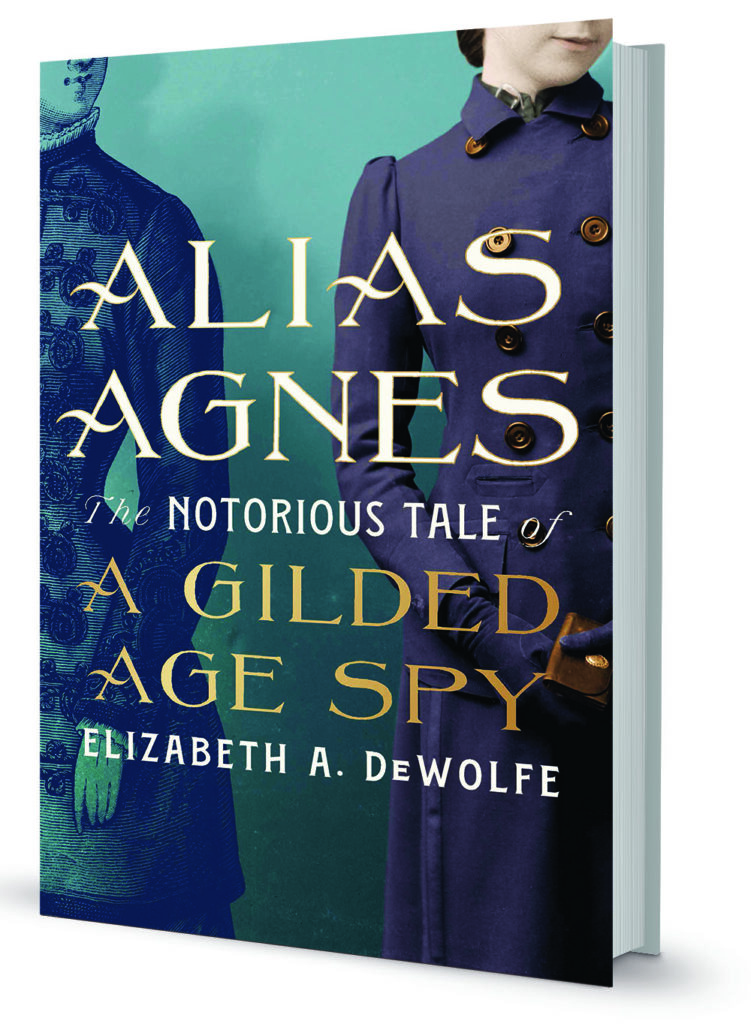Elizabeth DeWolfe ’83 explores the challenges and opportunities facing women on the eve of the 20th century while telling a tale of secrecy and suspense.
This was not the book I intended to write,” says Elizabeth (Ferrigno) ’83 DeWolfe, referring to Alias Agnes: A Notorious Tale of a Gilded Age Spy, published in April by the University Press of Kentucky.

Her plan, DeWolfe says, had been to chronicle the life of Madeleine Pollard, the former mistress of William C.P. Breckinridge, a congressman from Kentucky. In a widely publicized 1894 trial, Pollard sued Breckinridge for breach of promise, claiming he had seduced, then vowed and failed to marry her. At the time, the case (which Pollard won) was closely followed by a public eager for scandal, but little was known about the plaintiff before or after the trial. DeWolfe wanted to offer a full rendering of Pollard’s life, one that transcended the reductive label of “jilted lover.”
DeWolfe’s research led her, among many other places, to the reading room of the James Madison Memorial Building of the Library of Congress, where she pored through the more than 800 boxes of the Breckinridge Family Papers. In letters to the congressman from his lawyer, she noticed mentions of a “Miss P” and veiled references to some sort of covert intrigue related to the trial.
She had also read a sensational memoir, popular at the time, titled The Real Madeleine Pollard. The author, one Agnes Parker, claimed to have spent 10 weeks as an undercover spy in the house for fallen women where Pollard resided; her assignment, Parker wrote, had been to befriend Pollard and elicit information that Breckinridge could use to discredit her in the trial. Could “Miss P” and Agnes Parker be the same person, DeWolfe wondered? And who was Agnes Parker, anyway?
A professor of history and of gender, women, and sexuality studies at University of New England in Maine, DeWolfe is also a skilled — and stubborn — detective. Through extensive research, perspicacity, and “dogged persistence,” she finally ascertained that Parker’s real name was Jane Tucker. She then spent weeks scouring city directories, census records, Ancestry.com, newspapers.com — “all the tricks of the trade” — until she finally zeroed in on the right Jane Tucker among the nearly 76,000 women of that name born around 1863.

“That was the moment that crystallized reframing the book,” DeWolfe says. The result is the story of two women (three, if you count Agnes, Jane’s “girl spy” alter ego) leading very different lives: Tucker supported herself as a single woman, working several jobs (much to her family’s disapproval), while Pollard aspired to join Washington high society and dared to expose the double standards that applied to men and women’s sexual lives. Yet they both sought the same thing.
“They wanted to live a life they designed, not a life dictated by their gender or social class,” DeWolfe says. “They wanted the American dream — not the one that was assigned to women, but the one that men got: education, geographic mobility, financial independence, choice in marriage.”
Cherchez La Femme
That DeWolfe attended Colgate to study geology and astronomy but ended up majoring in an interdisciplinary program of anthropology, art history, and astronomy is in part due to two courses she took: one on the evolution of dinosaurs, taught by the late Robert Linsley, professor of geology, and one on archaeoastronomy, taught by Anthony Aveni, Russell Colgate Distinguished University Professor of astronomy and anthropology and Native American studies emeritus.
Thanks to their teaching, DeWolfe says, “I realized that what engaged me was not the bits and pieces of science, like chemical formulas or physics laws, it was the grand narrative of life on Earth. That’s what got me thinking about the past.” (The author dedicated Alias Agnes to Aveni.)
If she has devoted her career to shedding light on the ordinary women of the past, it’s in part because she had been “bored silly” in high school social studies classes, which consisted of memorizing lists of “great white men, the battles they fought, the countries they led, the discoveries they made.” At the time, the teenage DeWolfe wondered, Didn’t anyone like me ever do anything in history?
It’s also because by studying the lives of “the majority of people who have walked on this earth” — that is, everyday men and women — “we get a more complete, rich, and deep portrait of humanity,” DeWolfe says. “It enlarges our body of knowledge, so we have more information by which to march forward into the future.”

